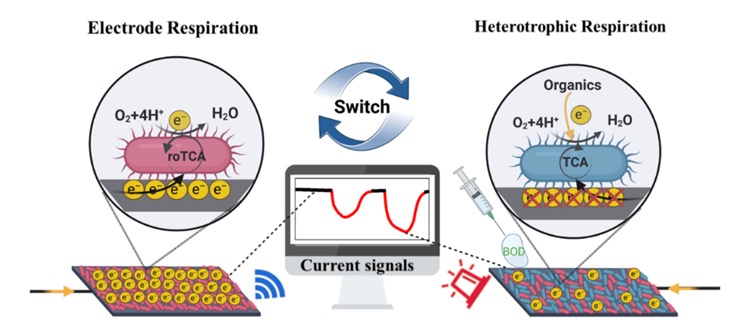NKU Team Realizes Rapid Detection of Low-concentration BOD in Oxygen-rich Water Environment
Recently, the “Microbial Electricity plus” research team of the College of Environmental Science and Engineering of Nankai University introduced a new strategy to realize rapid BOD measurement by using the competitive switching of electrotrophic and heterotrophic pathways of facultative bacteria.
The research team isolated and obtained a strain of Acinetobacter venetianus RAG-1 with both electrotrophic and heterotrophic respiration from microbial electroactive biofilms (EABs) over a period of five years. The findings of research reveal that this bacterium can respire with a polarized graphite electrode in the absence of degradable organic carbon source, and the current generated at this point can be used as the baseline of sensors. When degradable pollutants are present in the water, RAG-1 swiftly switches to heterotrophic respiration, resulting in a decrease in current. The decrease in current value is proportional to the concentration of organic pollutants. Based on this, the research team developed a novel bio-cathode BOD sensor, which has a linear response to common pollutants such as organic acids, sugars, proteins, humic acids, as well as mixtures such as low-concentration domestic sewage and lake sediments. It realizes sensitive monitoring of oxygen-rich and low-BOD water, with a test time of less than 3 hours.
This study further explains the switchover mechanism of facultative electrotrophic bacteria’s metabolic pathways and their adaptability and resilience to contaminated environment. Based on this new principle, the research team will develop more electrotrophic-heterotrophic microorganisms as sensing elements to support rapid BOD monitoring under complex environmental scenarios. This technique is expected to be used in water quality regulation for aquaculture, water quality monitoring for reclaimed water and so on. The findings were published on the water treatment top journal Water Research titled “Switchover of Electrotrophic and Heterotrophic Respirations Enables the Biomonitoring of Low Concentration of BOD in Oxygen-rich Environment”.

Fig. 1 Schematic diagram of facultative electrotrophic - heterotrophic bacteria response to BOD
Yilian Han, a 2022 doctoral student admitted to the College of Environmental Science and Engineering, Nankai University, is the first author. Assistant researcher Chengmei Liao and Professor Xin Wang are the co-corresponding authors.









